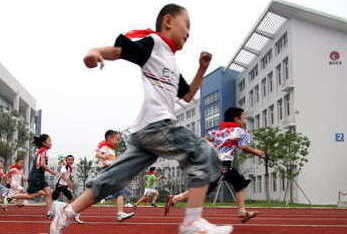Olympics a chance to help rural students improve health
Updated: 2007-11-03 10:08
As a rural high school teacher in East China's Shandong Province, I have witnessed my students getting noticeably fatter and their eyesight deteriorating in recent years. They have become less active and spend more time studying.
|
|
Our country has just celebrated the one-year countdown to the Beijing Olympic Games. Like every Chinese, we rural teachers feel very proud of the Games and all of the teachers and students in our school wish the Games a great success, and of course it will.
At the same time, we also hope the Olympics will become a precious opportunity to encourage our students to take part in sports, because with the make-or-mar college entrance exam before them, their health condition worries us more than their scores.
A recent survey by 10 organizations, including the State General Administration of Sport, the Ministry of Education and Ministry of Health, showed that 13.25 percent of Chinese teenage boys and 8.72 percent of girls are overweight, respectively.
Apart from obesity, Chinese students face other physical problems like short-sightedness and high blood pressure, and their stamina, speed, vital capacity and strength are decreasing.
In my class, the situation is no better. It is quite rare to see a student without glasses.
Compared with high schools in Chinese cities, rural schools cannot afford adequate physical education facilities. But in my opinion, facilities are not the major problem: cross-country running used to be our most-liked sport 20 years ago and we still promote this sport in rural schools.
As a matter of fact, the biggest obstacle is a conventional idea held by parents, students and some of my colleagues. They think that the more time they spend studying, the higher scores they'll get. But the idea is groundless and incorrect.
Zhong Nanshan, a renowned medical expert who became a household name in 2003 for his brave fight against SARS, said that sports and physical exercises can instead improve students' scores.
"If you spare one hour everyday doing sports, you can have a better memory and that can improve both your marks and your health," he said.
Zhong himself was a top student and a good athlete. He was a national 400 meters hurdles champion and still holds several track and field records at the Medical School of Peking University.
In the new semester, I hope that our school gives students more time for physical exercise, and that students take advantage of the opportunity.
With less than one year to go before the opening of the Beijing Olympics, I also hope the media and sports authorities will put more attention on rural students' health.
The author is a teacher at No 2 High School, Changyi City, Shandong Province.
|
|
|
||
|
||
|
|
|
|
